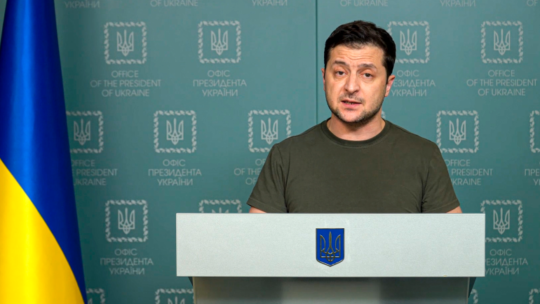
Late on October 7, as Russian president Vladimir Putin was celebrating his 70th birthday, the Kerch Bridge, connecting Russia and Crimea, exploded.
Crimea is part of Ukraine, but in 2014 Russia invaded and annexed it, prompting international protests. Russia completed the bridge in 2018, a crowning achievement for Putin. For many Ukrainians, the bridge is a symbol of Russian imperialism. Accordingly, its destruction was a strategic military success and an important communication victory.
Soon some Ukrainian officials and government departments played a hunch. They decided a light-hearted celebration of the bridge's destruction would strike the right tone on social.
Similar to using humor as a PR tactic, employing levity during a war is a calculated risk. This time it worked. What followed was another success in Ukraine's wartime social media strategy.
Moreover, the tweets you'll see below helped Ukraine elevate a domestic victory into an international one.
The Tweets
Noting the bridge's demise and an earlier Russian defeat, sinking a guided missile cruiser, Ukraine's defense ministry tweeted, "What's next in line, russkies?" (10,741 retweets, 80,750 likes)
An official Ukraine government feed tweeted simply: “sick burn.” (17,551 retweets, 175,787 likes)
The country's vice-prime minister tweeted a photo of the burning bridge below a laughter emoji. (3,818 retweets, 40,842 likes)
The guided missile cruiser Moskva and the Kerch Bridge – two notorious symbols of russian power in Ukrainian Crimea – have gone down.
What’s next in line, russkies?— Defense of Ukraine (@DefenceU) October 8, 2022
sick burn
— Ukraine / Україна (@Ukraine) October 8, 2022
— Mykhailo Fedorov (@FedorovMykhailo) October 8, 2022
Soon Twitter users engaged with the posts, adding memes and jokes, further driving engagement. The tweets were among the top 5% most retweeted posts by each account since the war began.
Engagement was a quantitative and qualitative success. In addition to the number of those who engaged with the tweets, the posts were valuable because of who engaged with them.
A comparison of typical followers vs those who retweeted Kerch Bridge posts from the three accounts reveals the messages reached a disproportionately western audience.
In addition, there was much engagement from English-language accounts in the US and UK. Notably, western engagement spanned the political spectrum, with liberals and conservatives sharing Ukraine’s posts.
One day after the strike, eight of the ten most-retweeted posts about the war, excluding news, supported Ukraine and its ability to win. Sen. Rob Portman (R-OH), Rep. Adam Kinzinger (R-IL), and journalist Dan Rather joined the discussion, saying Ukraine continues to prove it deserves military aid.
Public Interest Falling
On the other hand, global public attention for the war is waning. In the US, just 25% of Americans followed the war closely as of September. This is down from 36% in April, according to a Pew poll.
Similarly, 20% of Americans believe Washington is providing too much aid for Ukraine, up 8% from April. This is natural.
Yet these figures underscore why Ukraine must keep global focus on the war and public opinion on its side.
Driving engagement on Twitter helps keep Ukraine top of mind among western political and media elites, who are overrepresented on the platform. Ukraine's posts, such as those about Kerch Bridge, ignite positive online engagement and demonstrate bi-partisan support.
The 3 tweets above kept a western Twitter audience engaged without making its members ponder the complexity of war. Moreover the tweets' tone displays Ukraine’s trademark defiance.
A lesson for communicators–meet your target audience where it lives and match your posts' tone to that of the channel.
The war's future is uncertain as is the level of support flowing to Ukraine from the US and other countries. Ukrainian tweets alone can't change American foreign policy. But in the face of waning public interest and support, Ukraine must capitalize on every opportunity. These tweets did.
Alden Daniel is an insights strategist at Kivvit
